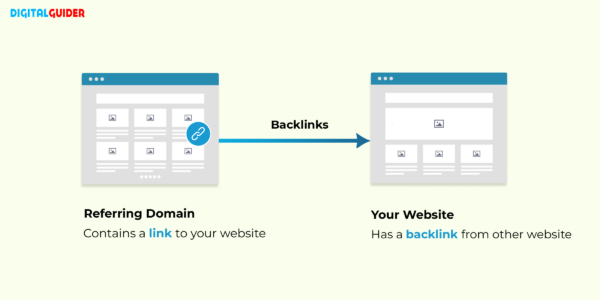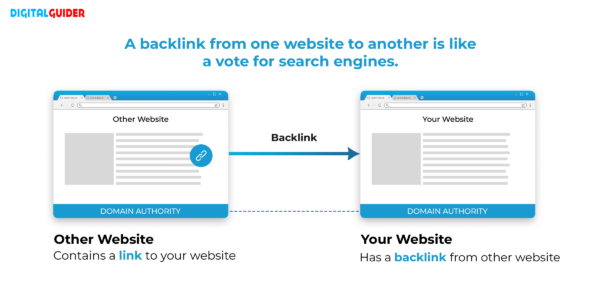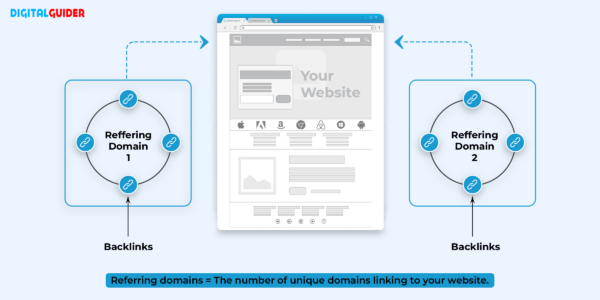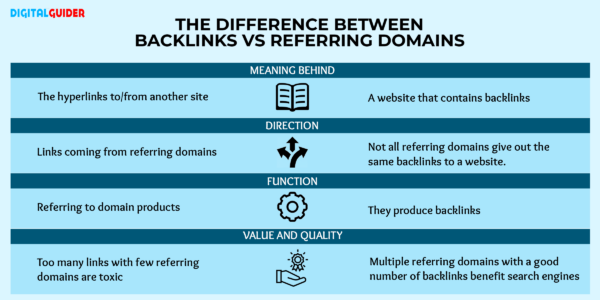Backlinks vs referring domains: Do you know the difference? If not, then guide is for you…
With over 1.9 billion sites online today, the question is, how can you get on the first Google page?
In digital marketing, where competition is fierce, understanding the backlink vs. referring domains is crucial for boosting your Google rankings.
Getting SERP ranked is not hard, but being on the first page is challenging, and as the adage goes, “If something is not on the first page of Google, it doesn’t exist!”
For those of you who are not familiar with these terms, backlinks are links that point to a specific page on a website from another website, while referring domains are the number of unique websites that link to a particular website.

When it comes to SEO, backlinks and referring domains are two of the most significant factors to consider. To make this crucial task easier, partner with a trusted SEO agency who can rank your site higher on SERPs.
But what’s the difference between them? And which one should you focus on for better search rankings? In this blog, we’ll dive into the world of backlinks and referring domains, explaining what they are, how they work, and which one is more important.
What are Backlinks?
Backlinks are links from other websites that lead to your website. These are only links to your website made on another website (referred domain). They are also referred to as incoming or inbound linkages. Backlinks are a solid vote of confidence from other websites. It means that they would rate your content to be at a high level.
Backlinks are essential to SEO since they encourage search engines to see that the site is valuable and relevant. Search engines will rank your website higher the more backlinks it has. This is so that Google will recognize that the website is well-known and reliable if reliable websites are linked.
Example of backlinks in SEO
Let’s say you have a business blog about healthy eating and write an article about the benefits of green tea. A backlink is simply a link from another website that points to your blog. In this case, a well-known nutritionist reads your article and decides to share it on their own blog, including a link to your article. This backlink tells search engines that your article is valuable and relevant, and it can help improve your search rankings for the keyword “green tea benefits.”

A backlink is helpful if it:
- Comes from an authoritative source
- Leads people to your website
- Points to a crucial service or page
In simple terms, a backlink would mean that a different website from yours has deemed your content of such high-quality. It means they would like their readers to refer back to your content. And read the desired article or whatever you have posted.
What are Referring Domains?
Now let’s consider referring domains. Referring domains are the number of unique domains linking to your website. Referring domains and backlinks are often confused. You can understand backlinks as physical links from another page to your site. Referring domain mentions that the domain linking to your site refers to your domain as another great place for content.
Example of referring domains in SEO:
In this case, let’s say you have another article on your blog about healthy smoothie recipes, and it’s been shared by multiple nutrition bloggers. Each of these bloggers has its own website, considered a referring domain. The more linked domains you have, the more credible and trustworthy your website appears to search engines. The higher your search rankings are likely for various keywords related to healthy eating.

Difference Between Backlinks & Referring Domains
Backlinks and referring domains are two critical metrics for SEO. Understanding these two concepts’ differences is essential for any successful SEO strategy as they help search engines determine the relevance and quality of a website.
Backlinks can be created in many ways, such as by writing guest posts or getting featured on other websites. On the other hand, referring domains measure a website’s domain authority, which is determined by how many high-quality backlinks it has. Domain authority is an essential metric for search engine rankings, indicating a website launch success, trustworthiness, and popularity.

Backlinks can give you an advantage in search engine rankings while referring domains can help you build relationships with other websites and increase your visibility online.
Understanding how backlinks and referring/linked domains work together will help you create a more effective SEO strategy and improve your ranking on search engines like Google.
Referring Domains vs Backlinks: How Do They Impact SEO Ranking?
The eternal question in SEO: Which has more value, backlinks or referring domains?
Like most things in SEO, the answer is “it depends.” Let’s break it down!
A backlink is a link from one site to another. So, if site A links to site B, that’s a backlink. A referring domain is the number of unique domains linking to your site.
So, if sites A and B link to site C, that’s two referring domains.
Now, which is more valuable? That depends on the quality of the links.
A high-quality backlink from a well-respected site will carry more weight than a low-quality backlink from a less well-known site. However, many low-quality backlinks can also hurt your SEO efforts. As always, it’s essential to focus on quality over quantity.
Note: Increasing your backlinks isn’t enough — having multiple backlinks from various referring domains is best.
With authoritative referring domains and numerous backlinks, you can enjoy the following SEO improvements:
A) Increased traffic:
People can find your site in more locations than search results. Backlinks allow other audiences to discover your website, increasing traffic, social media engagements, and possible conversions.
B) Improved credibility:
When multiple authoritative sites link to your pages, users (and Google) will notice that your site is a source of information. Google will likely point to your site when pulling search query answers.
C) Higher rankings:
Overall, backlinks from quality domains can help your site rank higher in search engine results pages (SERPs). As Google notices your connections with other sites, it will rank you above sites with fewer or low-quality backlinks.
Best Practices For Building Referring Domains And Quality Backlinks
1- Make producing pertinent material a priority:
Making relevant content a priority is one of the finest strategies to obtain free, high-quality backlinks. When you post content your target audience finds interesting, other websites will probably link to it. Additionally, you can contact websites you believe would’ve been interested in referring to your material and request a backlink from them. When the links are to useful and pertinent content, numerous website owners are delighted to share them.
2- Publish informative infographics:
It’s time to put the new knowledge to use now that you understand how to get referring domains & free backlinks for your website. Infographics are yet another excellent technique to communicate things visually attractively and acquire high-quality backlinks.
3- High-Quality Sites Guest Posts:
Guest posting on top websites is a terrific approach to obtaining high-quality backlinks for nothing. You may improve your SEO and increase traffic to your website by including a link to it in your author bio when you guest post. To maximize the benefits of guest posting efforts, you must find high-quality websites pertinent to your niche. These websites will likely publish your writing and link back to you.
4- Repurposing your content:
Repurposing your content is one of the best strategies to improve your content’s reach, increase engagement, and gain free backlinks to your website. Simply put, this refers to utilizing previously developed content differently. For instance, you might convert a blog post into a podcast, infographic, or video. This not only increases the visibility of your material but also improves the SEO of your website. The more backlinks your website has, the better it will appear in search engine rankings.
Backlinks & Referring Domains for Improved SEO Results
For SEO, referring domains and backlinks are both crucial. When planning a strategy to raise your search rankings, keep both elements in mind. Referring domains focus on your website’s overall authority and credibility, while backlinks concentrate more on specific links.
You can create a thorough SEO strategy that raises the ranking of your website in the SERPs by comprehending the distinctions between these two factors. Partner with a renowned SEO agency USA to boost your site’s authority, visibility, and sales. Get a free consultation now.
FAQs – Backlinks vs Referring Domains
Q1. What is a referring URL?
A1. A referring URL refers to the website URL from which a visitor arrived at your page after clicking on a link.
Q2. What are the distinctions between three-tier backlinks?
A2.
Three-tier backlinks differ by quality and purpose: Tier 1 links directly to your site (high authority), Tier 2 boosts Tier 1, and Tier 3 strengthens Tier 2 with bulk links.
Q3. Do you need permissions for backlinks?
A3. A link or hyperlink provides a connection between your website and another site. You do not need permission to add a link to your website. Nor is it a copyright infringement.
Q4. What kind of backlinks should be avoided?
A4. Avoid spammy, low-quality, and unnatural backlinks
Q5. How to identify websites that are relevant and authoritative for link building?
A5. To identify authoritative websites for link building, check domain authority, assess content quality, evaluate audience engagement, review the link profile, and ensure niche relevance.
Q6. How do you find referring domains?
A6. You can find the referring domains through SEO tools like SEMrush, MOZ, and Ahrefs.
Q7. What is the ideal number of referring domains needed to improve your SEO rankings?
A7. Generally, around 40 backlinks are enough to have around 5000 visitors monthly. Thus, around 100 backlinks from high-quality, relevant websites are more than enough.
Q8. Is it illegal to purchase backlinks?
A8. Google would not know whether or not it was purchased. So, technically it is not illegal. But if it doesn’t like your site or marks it lower and detects paid links, you risk getting penalized.







